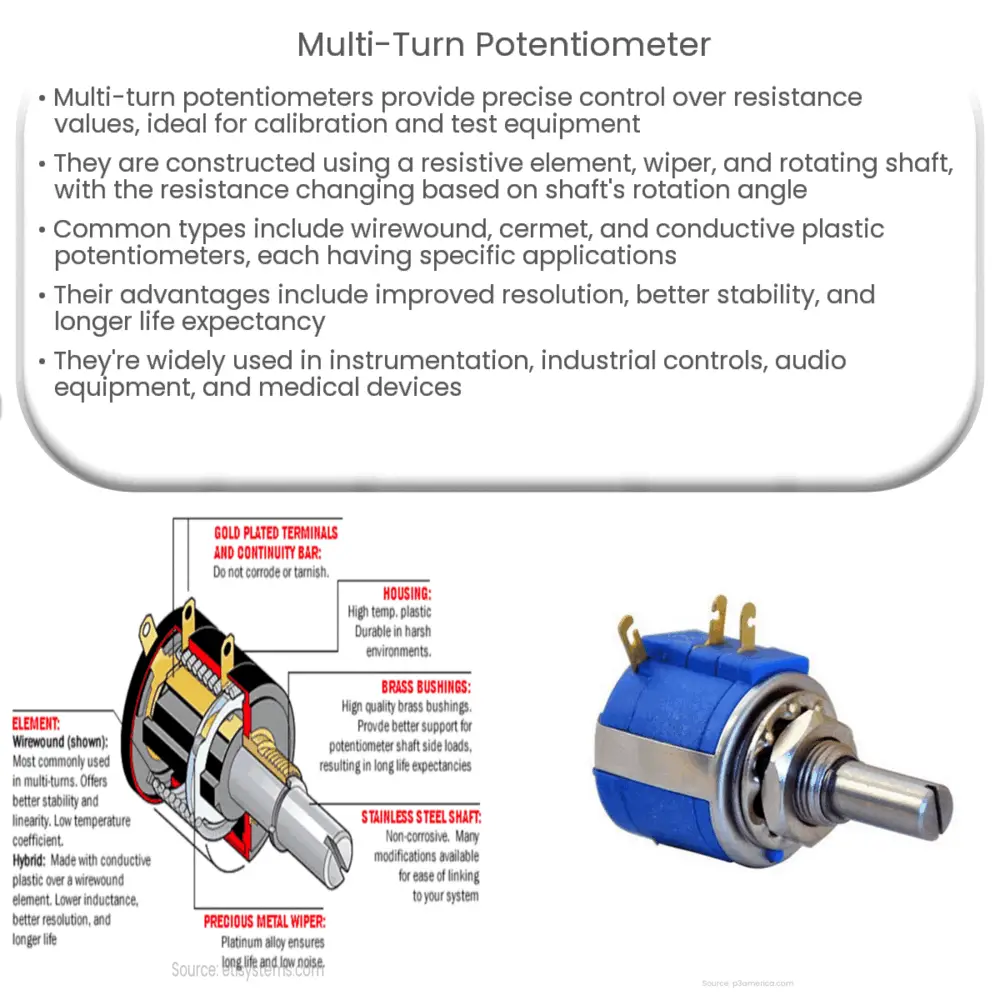A multi-turn potentiometer is a precise variable resistor with an extended rotational range, ideal for fine-tuning resistance in various applications.

Multi-Turn Potentiometer: An In-Depth Look
Introduction
A multi-turn potentiometer, also referred to as a multi-turn trimmer or precision potentiometer, is a type of variable resistor designed to provide precise and accurate control over resistance values in electrical circuits. Unlike single-turn potentiometers, multi-turn potentiometers have a longer rotational travel, enabling fine adjustments across multiple rotations. This feature makes them ideal for applications where precise tuning is required, such as in instrumentation, calibration, and test equipment.
Construction and Working Principle
Multi-turn potentiometers are constructed using a resistive element, wiper, and a rotating shaft. The resistive element, typically made from materials such as carbon, cermet, or conductive plastic, is shaped into a helical or spiral pattern, allowing for multiple turns. The wiper, which is a conductive contact, slides along the resistive element as the shaft rotates, effectively changing the resistance between the wiper and the two ends of the resistive element.
As the shaft is rotated, the wiper moves along the resistive track, varying the resistance proportionally to the shaft’s rotation angle. The total resistance of the potentiometer remains constant, while the resistance between the wiper and one end of the resistive element changes, creating a voltage divider in the circuit. This voltage divider effect allows users to control voltage or current levels in various applications accurately.
Types of Multi-Turn Potentiometers
There are several types of multi-turn potentiometers, differentiated mainly by their construction, resistance element materials, and rotational range. The three most common types are:
- Wirewound Potentiometers: These potentiometers use a wire-wound resistive element, typically made from materials such as nickel-chromium or tungsten alloy. Wirewound potentiometers provide high power handling capabilities and excellent temperature stability, making them suitable for high-precision applications and harsh environments.
- Cermet Potentiometers: Cermet potentiometers feature a resistive element made from a mixture of ceramic and metal materials, providing a combination of high stability, low temperature coefficient, and long-life expectancy. These potentiometers are often used in high-precision applications where stability and reliability are critical.
- Conductive Plastic Potentiometers: These potentiometers use a conductive plastic resistive element, which offers low noise, smooth operation, and a relatively long rotational life. Conductive plastic potentiometers are widely used in applications requiring high resolution and smooth operation, such as in audio equipment and industrial control systems.
Advantages of Multi-Turn Potentiometers
Multi-turn potentiometers offer several advantages over their single-turn counterparts, including:
- Improved Resolution: The extended rotational range provides finer control over resistance values, allowing for precise adjustments in applications where small changes in resistance are critical.
- Better Stability: Multi-turn potentiometers typically exhibit greater stability over time and temperature, making them ideal for applications requiring consistent performance.
- Longer Life Expectancy: Due to their construction, multi-turn potentiometers often have a longer operational life compared to single-turn potentiometers, reducing the need for frequent replacements and maintenance.
Applications of Multi-Turn Potentiometers
Multi-turn potentiometers find use in a wide range of applications across various industries, including:
- Instrumentation: Multi-turn potentiometers are frequently used in precision instruments such as oscilloscopes, multimeters, and signal generators to provide accurate control over signal amplitude, frequency, or phase.
- Calibration Equipment: Due to their high resolution and stability, multi-turn potentiometers are ideal for use in calibration equipment, where precise adjustments are required to maintain the accuracy and performance of measuring instruments.
- Industrial Controls: Multi-turn potentiometers are used in industrial control systems to provide precise control over variables such as temperature, pressure, and flow rates.
- Audio Equipment: In audio equipment, multi-turn potentiometers are utilized for precise volume control, balance adjustments, and equalization settings, ensuring optimal sound quality and performance.
- Medical Devices: Multi-turn potentiometers are employed in medical devices, such as infusion pumps and ventilators, where precise control over fluid delivery rates or air pressure is essential.
Choosing the Right Multi-Turn Potentiometer
When selecting a multi-turn potentiometer for a specific application, several factors should be considered:
- Resistance Range: Choose a potentiometer with a resistance range that matches the requirements of the application, ensuring accurate control over the desired resistance values.
- Rotational Range: Consider the number of turns required for the desired resolution and adjustability. Most multi-turn potentiometers offer 3 to 20 turns, with some specialized models providing up to 50 turns or more.
- Power Rating: Select a potentiometer with a power rating suitable for the application, considering factors such as voltage and current levels, as well as operating temperature.
- Linearity: The linearity of a potentiometer describes the relationship between the shaft’s rotation angle and the output resistance. For applications requiring a linear response, choose a potentiometer with a high linearity specification.
- Operating Temperature: Ensure that the potentiometer can withstand the operating temperature range of the application, taking into account any temperature fluctuations and extreme conditions.
- Mechanical Life: Consider the expected mechanical life of the potentiometer, as this can impact its long-term reliability and performance in the application.
Conclusion
Multi-turn potentiometers offer increased resolution, stability, and a longer life expectancy compared to single-turn potentiometers. Their versatile nature and precision make them suitable for numerous applications across various industries. When choosing a multi-turn potentiometer, it is essential to consider factors such as resistance range, rotational range, power rating, linearity, operating temperature, and mechanical life to ensure the best possible performance and reliability in the desired application.

